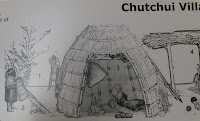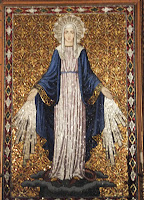http://missiondolores.org/old-mission/visitor.html
The Misión San Francisco de Asís was founded June 29, 1776. The settlement was named for St. Francis of Assisi, the founder of the Franciscan Order, but was also commonly known as "Mission Dolores" owing to the presence of a nearby creek named Arroyo de los Dolores, or "Creek of Sorrows."
Mission Dolores is the oldest intact building in the City of San Francisco and the only intact Mission Chapel in the chain of 21 established under the direction of Father Serra. The Mission has been a steadfast witness to the span of San Francisco's history including the California Gold Rush and the 1906 San Francisco Earthquake. The Mission Cemetery is the only cemetery that remains within the City limits. The Cemetery is the final resting place for numerous Ohlone, Miwok, and other First Californians as well as notable California pioneers.
There was so much to see, I've divided it into several sections. We begin with the outside:
 |
| Parking was the hardest part. |
 |
| On-line photo. |
 |
| Part of the old and part of the new. |
 |
| Closer up. |
 |
| Marion at the gate. |
 |
| Looking up to see the top. |
 |
| In a small courtyard. |
 |
| Fr. Serra |
 |
| Interesting succulent. |
 |
| Succulent with flowers! |
I want to start with the history shown in old photographs in the museum.
 |
| One of the models set in a corner. |
 |
| One of the reasons for all the missions was to convert the Indians. Indians at Mission 1816 |
 |
| Mission scene from 1826 |
 |
| Bullfights at mission 1842 |
 |
| Parish Rectory Seminary Inn 1860 |
 |
| After the 1906 earthquake. |
 |
| Mission Dolores today. |
 |
| Papal Visit Sept 17, 1987 Beatified May 1, 2011 |
 |
| An old altar. |
 |
| Quail, a common bird at the mission. |
 |
| Indian Mannequin |
 |
| Music was important part of ceremonies and everyday life. |
I captured this image of the Ohlone home called a ruway.
Then we found a real one outside.
 |
| Chutchui Village of 1775 These ruway could be as small as 6-8 ft. diameter or as large as 20 ft. depending on the family. The larger had smoke holes that could be covered when it rained. |
 |
| Bay Area Ohlone Indian hut. |
Inside the Mission, I was again reminded of the power of paint. I don't think I need to point out the ceiling. Most ceiling have subdued motifs of alternating flowers and designs.
 |
| The real altar. |
 |
| A painted wall on the side. |
 |
| These columns are on both sides of the altar. |
 |
| I guess you would call them side altars with different figures. |
 |
| Ft. Serra |
 |
| Stairs in the back. |
I was totally unprepared for the splendor of the Basilica. Even though I could not capture a photograph of the windows, believe me, they are awesome:
 |
| The entry is in a narrow hallway between the two. |
 |
| Just inside the door is this magnificent statue. |
 |
| WOW! |
 |
| View from the side so you can see the ceiling. |
 |
| Close up of the pews and the beautiful carved wood. |
 |
| It's not an umbrella but to help the sound carry. |
 |
| Beatified in 2011 |
 |
| 2 of the Missions. |
 |
| When too much light comes through the stained glass, sometimes I can get the window and sometimes not. You'll just have to visit here yourself! |
 |
| I love the way artists depict holiness. |
 |
| Here the halo goes all around Our Lady of Guadalupe |
 |
| The altar up close. |
 |
| A family plot. |
 |
| Stones from 1776. |
 |
| Interesting "flowers" |
 |
| Fr. Serra |
 |
| Love this bench. |
 |
| We were greeted by a robin. |
No comments:
Post a Comment